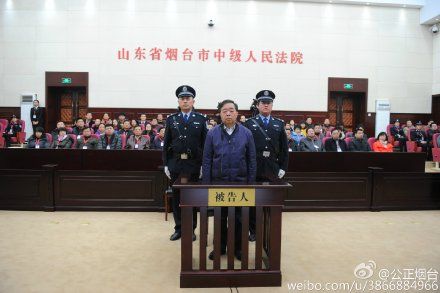Former Nanjing mayor stands trial
(Xinhua/chinadaily.com.cn) Updated: 2015-01-16 10:34
 |
|
Ji Jianye stands trial in the Yantai Intermediate People's Court in Shandong Province, Jan 16, 2015.[Photo/weibo.com] |
BEIJING - Ji Jianye, former mayor of Nanjing, capital of Jiangsu Province, stood trial on Friday morning. He is being tried in the Yantai Intermediate People's Court in Shandong Province.
The court began at 8:30 am.
Ji is suspected of accepting bribes and abusing power, according to a previous statement by the Supreme People's Procuratorate.
Ji, 57, is accused of taking bribes of 20 million yuan ($3.3 million) and allegedly gave the green light to friends who had projects to be approved by him when he worked in Suzhou, Kunshan, Yangzhou and Nanjing cities in Jiangsu.
Ji was taken away in Nanjing for investigation in October. The Supreme Procuratorate appointed the People's Procuratorate of Shandong province to investigate the case, and then transferred it to Yantai's procuratorate and court for trial.
Senior officials are often investigated by prosecutors from other places and charged in other cities' courts to help ensure that defendants obtain impartial trials, according to the Supreme People's Court.
Chinese media reported that Ji had several mistresses, including Jin Qiufen, director of Yangzhou's environmental protection bureau, and Zhou Bing, deputy director of Yangzhou's development and reform commission.
Ji is also said to have promoted a mistress, who was a waitress, to the position of manager at a hotel.
Ji has remained a controversial official for years. Though some government workers in the province said he was determined and contributed to economic development, negative views of him were reported from time to time.
He initiated the project to repair Nanjing's main roads and demolished several intercity highways without the approval of the local people's congress in 2009. The project was blamed by many residents for worsening traffic congestion and wasting tax money.
He was also widely criticized when he planned to remove the city's famous parasol trees for subway construction.
Since November 2012, when the new leadership took office and launched the anti-graft campaign, more than 40 officials at the ministerial level or above have been sent to prison or investigated for corruption.
To gather information about corrupt officials, the central government has sent inspectors on six rounds of inspections in key provinces and regions, educational institutes and central authorities and administrations.
- Govt encourages people to work 4.5 days a week
- Action to be taken as HIV cases among students rise
- Debate grows over reproductive rights
- Country's first bishop ordained in 3 years
- China builds Tibetan Buddhism academy in Chengdu
- Authorities require reporting of HIV infections at schools
- Typhoon Soudelor kills 14 in East China
- Police crack down on overseas gambling site
- Debate over death penalty for child traffickers goes on
- Beijing to tighten mail security for war anniversary







